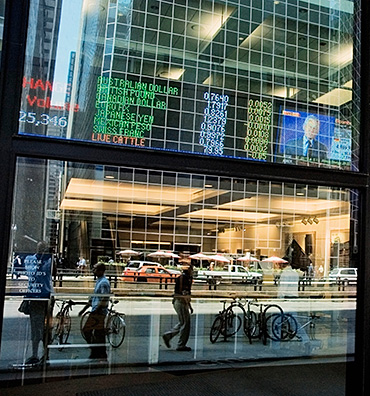In the world of banking, competition is fierce. In fact, it’s such an important feature of this landscape that it may come as some surprise that there’s a willingness by major institutions to consider using the same infrastructure or services.
Yet this notion of mutualised services, in which multiple banks agree to use the same solution, is now recognised as one of the key emerging trends in financial services. In the area of post-trade technology in particular, institutions, firms and even exchanges are beginning to acknowledge that many of the challenges they’re facing are common across the board.
The burden of legacy infrastructure and technology
Among the most pressing is the need to overhaul the aging technology still being used by institutions to complete many of their vital middle and back office functions. Some of these IT systems are now three or four decades old, formed out of a mish-mash of mergers, old systems and various legacy platforms. The additional complexity and cost being generated by these spaghetti-like tangles of various different systems is becoming all too clear.
To outsource or not to outsource
That’s why many banks are now seriously considering the benefits of outsourcing: either through the use of mutualised services, the creation of utilities or the use of a third-party vendor.
In fact, according to research findings from Oliver Wyman1, some 28 per cent of banks said they were looking for the next wave of outsourcing opportunity - including the mutualisation of volumes - and that they also believe outsourcing is inevitable given the standardisation of post-trade processing. The same report also discovered that from those banks surveyed who said they were planning to outsource in the future, 33 per cent believed this would be through mutualising with another institution or industry consortium.
Post-trade regulatory pressures
This need for greater collaboration is also being driven by the rapid pace of regulatory change currently impacting the post-trade arena. Many of the new reporting requirements, such as those mandated by MiFID II or SFTR, mean that all banks will need to take the same steps to make sure their IT systems and operational practices are up to scratch. In the next few years, this is likely to create a collective re-think among those in the post-trade sector as they realise the scale of their common challenge.
In turn, this is likely to lead many banks working together to meet these demands in the most cost-effective way possible. This may mean the mutualisation of certain back office functions, an increased use of open architectural standards or an increased reliance on partnerships with established technology vendors.
Banks now jointly understand that there is no differentiation to be had in many of the post-trade processes and functions they need to carry out, but there are significant opportunities to reduce these costs. The term ‘outsourcing’ is still not especially popular in the banking community, but the need for greater collaboration and to partner in a different way with other organisations is becoming apparent.
We understand the challenges our clients face in the rapidly changing post trade sector. By using us as their trusted technology partner, our customers have been able to free up valuable internal IT resource to focus on their core business, in turn helping them to reduce complexity and their total cost of ownership.
We also have an unrivalled track record of working in the post-trade space, having partnered with all the major clearing and custodial services providers, as well as running the SettleNET service in the UK for over 20 years. Our global network is also unrivalled, offering clients fast and reliable infrastructure while removing the need for additional administration costs or overheads.
The future of financial services is changing
Yet while the notion of mutualised services or post-trade utilities is far from new, it certainly seems to have been injected with a new sense of credibility in recent years. That’s also reflected in the Oliver Wyman report findings, which estimates the overall size of the post-trade operations outsourcing market opportunity in Europe (excluding custody) in the coming years will be in the range of EUR 1.1 billion to EUR 1.8 billion.
But even though a portion of this will be from evolving partnership models, such as mutualisation, an even more significant proportion of this will be realised through traditional and more mature one-to-one outsourcing models. We also see strong demand from those in the industry to partner with a leading technology vendor, which is a tried-and-tested model which they know works and works well.
Yet whichever form it takes, there’s little doubt that banks are making strong moves towards greater collaboration in many of the key post trade functions, even if it does go a little against the grain to share some of the same solutions and infrastructure as their competitors.
1 Oliver Wyman: https://www.oliverwyman.com/content/dam/oliver-wyman/v2/publications/2017/oct/Post-Trade-Investment-Banking-Outsourcing.pdf
